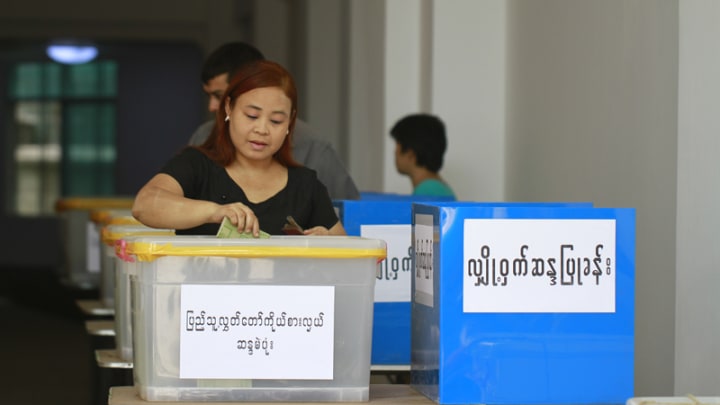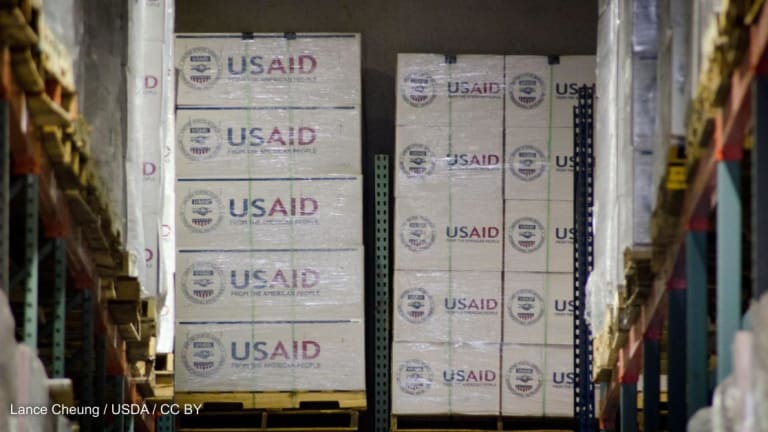
Myanmar goes to the polls on Nov. 8 in a crucial election that will determine which party leads the country’s government next year. The election’s outcome — and the manner in which it is conducted — will also have important implications for the future of development cooperation inside a nation that has quickly transformed from pariah state to “donor darling.”
Plenty of questions remain about how best to support representative institutions, private sector development, disease-fighting efforts and many more priorities while Myanmar — formerly known as Burma — still wavers between democracy and military rule.
Foreign observers, journalists, and civil society organizations will all try to judge whether legitimacy or exclusion wins the day during these parliamentary elections, while foreign aid agencies and their funders will watch closely to decide how much and what kind of money should follow.
In the months preceding the election, onlookers have found reason for optimism in some areas and cause for worry in many others. On Oct. 15, the government, military and eight ethnic groups signed a joint cease-fire agreement. However, about a dozen additional armed ethnic groups chose not to sign the treaty.
Persecution of ethnic minorities remains a subject of international concern; and even Nobel Peace Prize winner and opposition leader Aung San Suu Kyi’s record on speaking out against hate-speech and violence against Islamic groups has been suspect. In Myanmar’s western Rakhine State members of the Rohingya Muslim minority, one of several ethnic groups barred from voting, could soon take to the seas in another round of dangerous emigration as the monsoon season subsides.
And as more than 30 million people prepare to cast their votes in the first ostensibly free elections in two and a half decades, one-quarter of Myanmar’s parliamentary seats have already been reserved for the military party’s hand-picked representatives.
As if that weren’t enough, the country has been beset by massive flooding, which has threatened to derail the elections altogether.
The opposition National League for Democracy party led by Suu Kyi has a hard path to victory. The military’s head-start means that in order to gain a majority in parliament and voting power to elect the president, the NLD will have to win two-thirds of the remaining seats.
On top of that, Suu Kyi is constitutionally barred from becoming president, thanks to a provision many believe was created intentionally to disqualify her.
On Thursday the opposition leader made it clear that if the NLD wins a majority and elects the president, she will still be the one calling the shots. “If we win and the NLD forms a government I will be above the president. It's a very simple message,” Suu Kyi said at a news conference in Yangon.
In light of the current government’s democratic shortcomings, some have argued the Obama administration has been too flexible in describing what it will consider a successful election. In a U.S. congressional hearing last month, Democratic Rep. Brad Sherman asked about changes to these standards.
“The State Department has had different definitions for what would be a successful election … the standard was ‘free and fair.’ For the November elections, we are calling for elections to be ‘transparent, inclusive and credible,’” he said, adding, “I don’t know whether this is a raising of the bar or a lowering of the bar.”
Daniel Russel, assistant secretary of state for East Asian and Pacific affairs, responded: “We will make our assessment based on what we hear and see, based on what we are told by Aung San Suu Kyi and the NLD.”
“We’ll listen to the Burmese media, and we’ll listen to the Burmese people … We’ll also look at the morning after,” Russel added.
The morning — and weeks — after the election will be critically important. Even a “transparent, inclusive and credible” election will be meaningless if the losing coalition refuses to accept its results.
Still, these elections are more than a formality. They will open up — or not — opportunities for new leadership and represent another benchmark along a bumpy road between dictatorship and democracy.
Democracy Matters is a global conversation hosted by Devex, in partnership with International IDEA, to discuss accountability as a central element of deepening democracy. Visit the campaign site and join the conversation using #DemocracyMatters.



